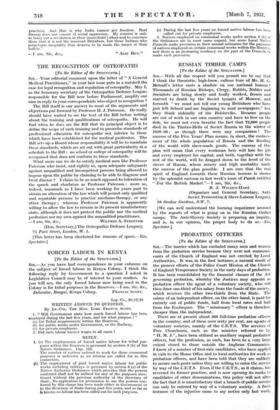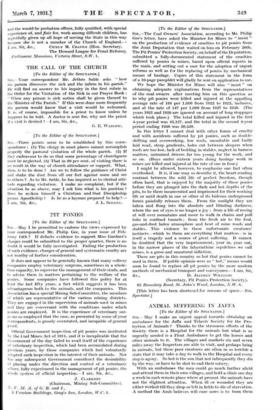PROBATION OFFICERS [To the Editor of the SPECTATOR.] SIR, —The barrier
which has excluded many men and women from the probation service because they were not communi- cants of the Church of England was not erected by Local Authorities. It was, in the first instance, a natural result of the pioneer efforts of the Police Court Mission of the Church of England Temperance Society in the early days of probation. It has been consolidated by the financial clauses of the Act governing probation, whereby the Justices may appoint as probation officer the agent of a voluntary society, who will then draw one-third of his salary from the funds of the society, which receives the other two-thirds from the State. The salary of an independent officer, on the other hand, is paid for entirely out of public funds, half from local rates and half from the Exchequer. The " missionary " officer is therefore cheaper than the independent.
There are at present about 268 full-time probation officers in the country, and of these over sixty per cent. are agents of voluntary societies, mainly of the C.E.T.S. The services of Free Churchmen, such as the minister referred to by " H. M. J.", have been utilized as auxiliary unpaid probation officers, but the profession, as such, has been to a ery large extent closed to those outside the Anglican Communion. I know of a number of first-rate candidates, who have applied in vain to the Home Office and to local authorities for work as probation officers, and have been told that they are unlikely to secure such posts unless they are willing to enter the service by way of the C.E.T.S. Even if the C.E.T.S., as it claims, has reversed its former practice, and is now opening its ranks to candidates of other denominations, this policy will not alter the fact that it is unsatisfactory that a branch of public service can only be entered by way of a voluntary society. A fresh instance of the injustice came to my notice only last week, and the would-be probation officer, fully qualified, with special experience of, and flair for, work among difficult children, has regretfully given up all hope of serving the State in this way because she is not a member of the Church of England.— I am, Sir, &c., Crchtx M. CRAVEN (Hon. Secretary,



























































 Previous page
Previous page